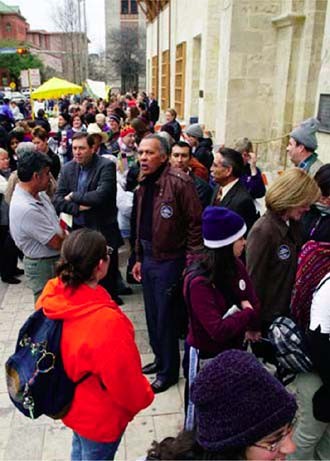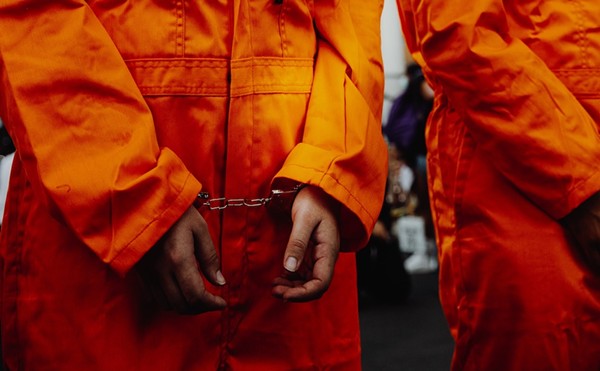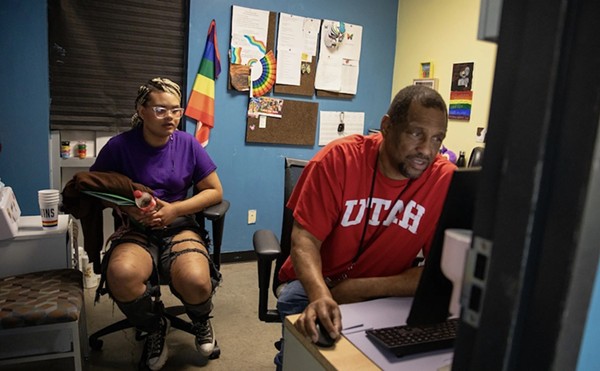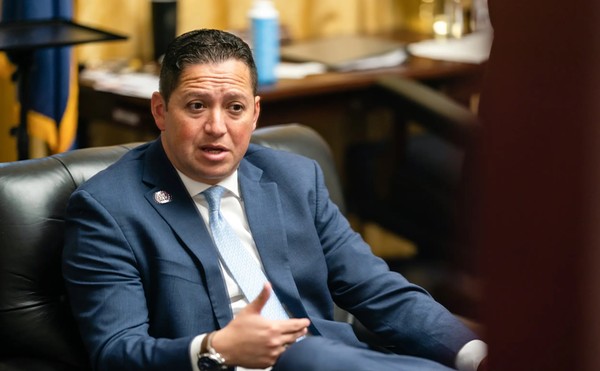|
It's been one year since San Antonio's FCC localism hearing. What did the public debate accomplish? January 28, 2004 could be considered one of the few days in modern San Antonio history when democracy worked. In late 2003, the Federal Communications Commission selected San Antonio as one of six U.S. cities to host localism hearings, allowing citizens to petition FCC commissioners about media concerns in their respective communities. So on a brisk winter day, hundreds of people lined up downtown, some as early as 4 a.m., to testify before the five commissioners, including Chairman Michael Powell, at City Council Chambers. Throughout the day, activists held boisterous rallies, media companies feted fellow bigwigs at soirees, and a pirate radio station broadcast in front of Clear Channel headquarters. By the time the last person testified after 11 p.m., the commissioners had heard opinions from wildly diverse groups: high school students, the hard-of-hearing, Clear Channel, one of the world's largest media companies, and community members from every side of the city. Since the FCC hearings, long-time concerns about media policy persist, while new issues have emerged: Clear Channel still owns about 1,200 radio and 39 TV stations, but Sinclair Broadcasting is vying for the title of media bogeyman after it tried to force its affiliates to air an anti-John Kerry polemic disguised as a documentary right before the November election. (After public outcry, Sinclair relented and aired a different program, "A POW Story: Politics, Pressure, and the Media.") And in at least four instances, the Bush administration has used taxpayer money to fund government propaganda masquerading as bona fide news programs. Yet, significant changes have occurred: Powell, a media consolidation advocate, announced that he is resigning from the chairmanship in March. On January 27, media consolidation took a another hit when the Justice Department announced it would not petition the Supreme Court to rule on the court case Prometheus Radio vs. FCC. Last year, a Philadelphia federal appeals court ruled in favor of Prometheus Radio, which, in effect, negated relaxed ownership rules that the commission had passed in June 2003 by a 3-2 vote. Last week, The New York Times quoted Commissioner Jonathan Adelstein, a Democrat, as favoring the Philadelphia court ruling. "This is a recognition of the failure of the commission to adequately justify its rules and is a recognition of its failure to protect the public interest. This is an historic decision for the media democracy movement." Clear Channel did not return several calls from the Current seeking comment. At last year's hearings, Clear Channel, whose headquarters are in San Antonio, took the brunt of criticism, as activists accused the company of failing to serve the public interest. "Brother Powell," said East Side activist T.C. Calvert, addressing the Commissioner. "In the flood of 1998, Salado Creek was rising, people's homes were being threatened, and KSJL `a Clear Channel station` was playing hits and oldies instead of warning people about the flood." Since last year, KSJL has added a local issues talk show, "Community Focus." Activists say that in addition to policy changes, the localism hearings generated an unprecedented citizen awareness of the FCC. "No longer are the machinations at the FCC going to be done quietly," says Russ Newman, program manager at Free Press, a non-profit media reform group. "You say the words 'Michael Powell' to the public today and it conjures up the idea of media consolidation." When the FCC Commission was considering the media consolidation rules, it received more than 2 million faxes, letters, and phone calls from conservative and liberal groups. This is evidence, says Hannah Sassaman, organizer with the Prometheus Radio Project, that "People have engaged with the FCC as their regulatory body that addresses the needs of their communities. They know the FCC is the place to go to demand change." In the past year, conservative groups, many of which also oppose Powell's policies, have focused their activism on broadcast decency standards. Parents Television Council spokesperson Lara Mahaney says the conservative watchdog group became frustrated with Powell for endorsing what they see as lax decency standards. "We met with Michael Powell," Mahaney says, adding that the group supports Kevin Martin as the next commission chair. "It simply wasn't a priority for him." Under Powell's tenure, Clear Channel settled with the FCC for $1.75 million for decency violations; Viacom agreed to pay a record $3.5 million. Sassaman calls the decency standards "tantamount to censorship." "The answer isn't censorhip but a flowering of diversity of more media sources that reflect the values of the community." Kevin Martin, a Republican who worked as Deputy General Counsel for the Bush-Cheney campaign and served as Special Assistant to the President for Economic Policy, is considered by many media observers likely to replace Powell. Also mentioned is Becky Klein, former chairperson of the Texas Public Utility Commission. She also served as policy director for then-Governor George Bush, and now leads the government affairs practice the Loeffler Group, an offshoot of the law firm Loeffler, Tuggey, Paurstein, and Rosenthal. Last November, Klein lost to Democrat Lloyd Doggett for the 25th District House race. Since Martin was confirmed by the Senate as a commissioner, he would need to receive only the presidential nod to become chairman. Klein, or another non-commissioner would have to be confirmed by the Senate before the president could appoint him or her as chairperson. Although many media activists are pleased by Powell's departure and the Prometheus court case, media professor and author Robert McChesney writes on freepress.net that the fight over ownership rules could reignite during the second Bush administration. If the rules are relaxed, companies could own three TV stations, eight radio stations, a cable operator and a newspaper in the same city. Current rules prohibit a company from owning a newspaper and a TV or radio station in same city, or from owning two TV stations in the same market. The commission will also tackle the legalities of Low Power FM, 10-to-100-watt broadcast stations that serve as a voice for minority communities. Although there are 450 LPFM stations in the U.S., their places on the dial have been threatened by the National Association of Broadcasters and Clear Channel, which falsely asserted that low-power broadcasts would interfere with high-wattage programs. Senate Bill 2505, which is awaiting a floor vote, would open up frequencies to thousands of potential LPFM stations, thus denying the large broadcasters' claims. In the next four years, the most daunting task before the FCC is rewriting the 1996 Telecommunications Act to include rules governing advanced technology such as the Internet, broadband, satellite radio, and digital television and phones. "It `the new act` will reshape our media system as we know it," says Newman. "It will determine who controls the conduits and the access to the airwaves." • By Lisa Sorg
|
Tags:

KEEP SA CURRENT!
Since 1986, the SA Current has served as the free, independent voice of San Antonio, and we want to keep it that way.
Becoming an SA Current Supporter for as little as $5 a month allows us to continue offering readers access to our coverage of local news, food, nightlife, events, and culture with no paywalls.
Scroll to read more San Antonio News articles
Newsletters
Join SA Current Newsletters
Subscribe now to get the latest news delivered right to your inbox.

















